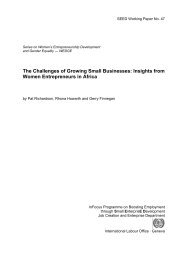manual: women workers' rights and gender equality - International ...
manual: women workers' rights and gender equality - International ...
manual: women workers' rights and gender equality - International ...
Create successful ePaper yourself
Turn your PDF publications into a flip-book with our unique Google optimized e-Paper software.
Briefing Note 7 Decent Work, Workers <strong>and</strong> their Rights<br />
Decent Work<br />
The primary goal of the ILO is to promote opportunities for <strong>women</strong> <strong>and</strong> men to obtain decent <strong>and</strong><br />
productive work in conditions of freedom, <strong>equality</strong>, security <strong>and</strong> human dignity.<br />
How can the goal of promoting decent work be achieved? In the work of the ILO it is seen as the<br />
combination of four strategic objectives:<br />
1. Achieving fundamental principles <strong>and</strong> <strong>rights</strong> at work<br />
2. Creation of greater employment <strong>and</strong> income opportunities for <strong>women</strong> <strong>and</strong> men<br />
3. Enhancing the coverage <strong>and</strong> effectiveness of social protection<br />
4. Promoting social dialogue<br />
Gender <strong>and</strong> development have been defined as crosscutting issues to be mainstreamed in all ILO<br />
activities.<br />
What is a Worker?<br />
The promotion of opportunities for <strong>women</strong> <strong>and</strong> men to obtain decent <strong>and</strong> productive work is a<br />
challenging task because of the diversity in types of work. All workers should be reached: The<br />
fundamental principle is that all those who work, both <strong>women</strong> <strong>and</strong> men, have <strong>rights</strong> at work. This<br />
means wage workers in formal enterprises, but also the self-employed, casual <strong>and</strong> informal<br />
workers, as well as the hidden, predominantly <strong>women</strong> workers in the care economy <strong>and</strong> in the<br />
domestic scene 23 .<br />
There is not yet a consensus, although it is growing, on the above-mentioned definition of workers.<br />
Often, there is a misunderst<strong>and</strong>ing about ‘workers’. People only think about wage workers in<br />
formal enterprises <strong>and</strong> the public sector when talking about workers. But everyone who works is a<br />
worker, whether they work as civil servant, informal sector worker, casual worker, homeworker or<br />
as a house-wife or house-man. This misunderst<strong>and</strong>ing can lead to excluding the most vulnerable<br />
groups like informal sector workers, homeworkers <strong>and</strong> domestic workers from policies <strong>and</strong><br />
workers’ <strong>rights</strong>. It should be clear that these groups are also workers <strong>and</strong> have <strong>rights</strong> at work as<br />
well.<br />
Rights at Work<br />
All those who work, both <strong>women</strong> <strong>and</strong> men, have <strong>rights</strong> at work.<br />
In Cambodia <strong>rights</strong> at work are written down in the Labour Code 1997. Cambodia ratified 12 ILO<br />
Conventions (see annex about the ILO <strong>and</strong> the session about <strong>rights</strong> at work). This means that<br />
Cambodia formally accepts those Conventions <strong>and</strong> is legally bound to apply the Conventions.<br />
Laws <strong>and</strong> regulations are adopted or modified in order to apply the Conventions. Furthermore, the<br />
Conventions must be applied not only in law, but also in practice.<br />
23 from: A Partnership of Equals, ILO Geneva, 2000<br />
150

















